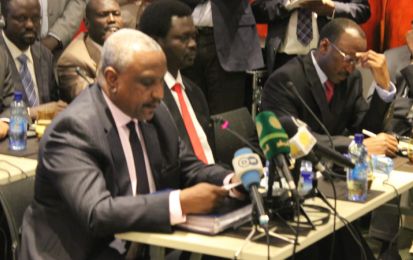Sudanese gov’t accuses rebels of seeking to use ceasefire for political reasons
November 25, 2015 (KHARTOUM) – The Sudanese government accused the rebel groups of seeking to use the cessation of hostilities to redeploy their troops and described their demand to deliver the humanitarian aid through South Sudan as an excuse to receive military supplies.

Sudanese presidential aide and chief negotiator for the Two Areas talks Ibrahim Mahmoud said his government aims to achieve two strategic goals including reaching a permanent peace with the arms bearers and engaging all groups in the ongoing dialogue in Khartoum.
He stressed in a press conference Wednesday that they agreed with the rebel Sudan People’s Liberation Movement/North (SPLM-N) during the previous nine rounds of talks on 90% of the framework agreement submitted by the African mediation, underscoring his government keenness to achieve a final settlement for the conflict in the Two Areas.
Hamid pointed the SPLM-N is not serious about achieving peace and ending civilian suffering, saying they only seek to elicit sympathy from international community to use the humanitarian work for political purposes.
“The government wouldn’t allow that,” he added
He underscored his government categorical rejection for allowing delivery of humanitarian assistance to South Kordofan and Blue Nile via South Sudan, saying the SPLM-N seeks to exploit the process to support its hostile acts against the Sudanese government.
The government chief negotiator added the SPLM-N since its inception in 1983, has never sought to end the war, pointing it continued to represent a major obstacle against achieving peace and stability in the country.
He said the SPLM-N wants to sign the cessation of hostilities agreement in order to allow humanitarian access to the Two Areas through South Sudan, pointing to the SPLM-N refusal for the 2012 tripartite agreement signed with the United Nations, African Union and the Arab League on humanitarian work.
Hamid stressed the demand of the SPLM-N to deliver assistance to the Two Areas via South Sudan seeks to fulfil political not humanitarian purposes, expressing his government readiness to implement the tripartite agreement.
The SPLM-N chief negotiator said they want to reach a cessation of hostilities agreement to create a conducive environment for the national dialogue and to allow humanitarian assistance for the needy in the conflict affected areas.
They also proposed to deliver the humanitarian aid from a neighbouring country to avoid the involvement of the government humanitarian body in the operation. The SPLM-N say the latter in infiltrated by the security service.
For his part, the chief government negotiator for Darfur track Amin Hassan Omer renewed commitment for the Doha Document for Peace in Darfur (DDPD) as the basis for completing the peace process, saying the document was endorsed by the UN Security Council and the stakeholders.
He said the armed groups in Darfur don’t want to identify positions of their forces while simultaneously say they want to achieve ceasefire, noting this could not be accepted logically.
“The [armed] movements want to use the cessation of hostilities agreement to redeploy their forces … the government knows that some of those movement are present in Libya while others are in South [Sudan] and we wouldn’t allow for redeploying them again,” he added.
Omer pointed the rebel movements don’t want humanitarian assistance to be delivered from points inside Sudanese territory but seek to deliver it from outside in order to use it to support their hostile acts against the country.
He said the last round of talks was much better than the previous one held in November 2014 when they failed to agree on the agenda, saying however they agreed on several points during the last round of talks.
The government chief negotiator added that the African mediation is convinced that his delegation was fully mandated within the framework of the government directives and the issues under discussion determined by the mediation.
He said the African mediation has not set a new date for the resumption of talks, expressing his delegation readiness to return to the negotiating table whenever it is invited by the mediation.
The Justice and Equality Movement (JEM) accused the government delegation of refusing to include the release of political prisoners in the discussions despite the fact that it is part of the confidence building measures.
JEM also said the government proposed one-month cessation of hostilities, and refused any role for the UN peacekeepers, UNAMID in the monitoring of the truce.
Last Monday the chief mediator Thabo Mbeki suspended the security and humanitarian talks and announced that he would organize on 7 December a preparatory meeting gathering the warring parties, the 7+7 committee of the national dialogue and the National Umma Party (NUP) .
The Sudanese army and its allied militias have been fighting a group of armed movements in Darfur since 2003.
Also, the border states of South Kordofan and Blue Nile state have been the scene of a violent conflict since 2011 when fighting broke out between the SPLM-N and Sudanese army.
(ST)
